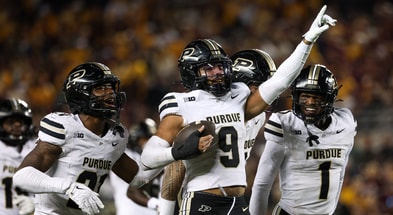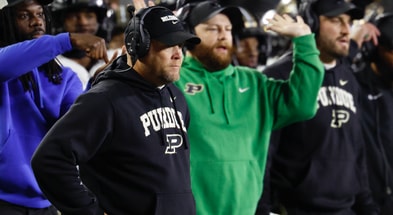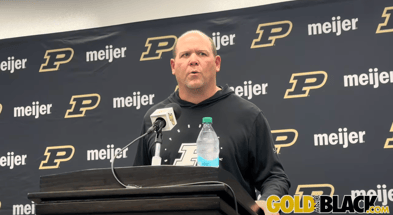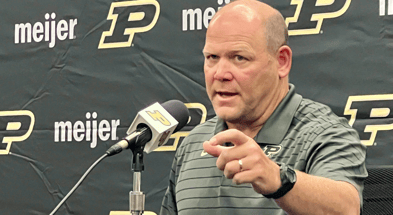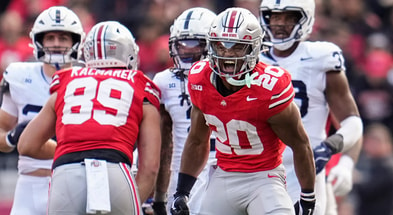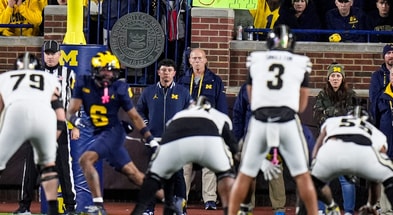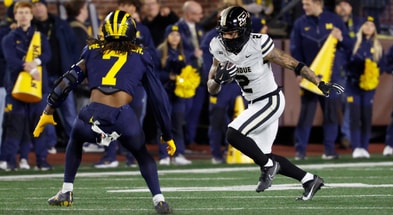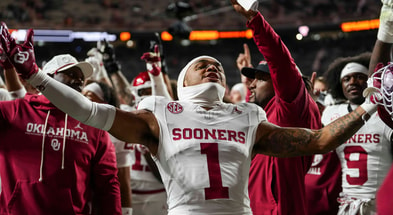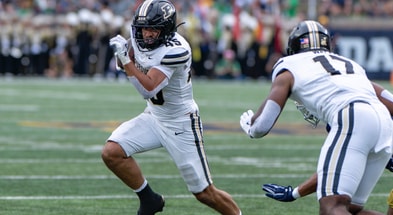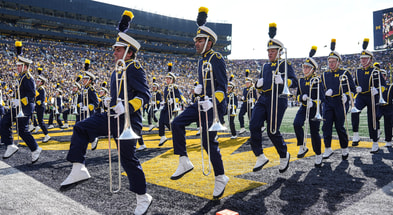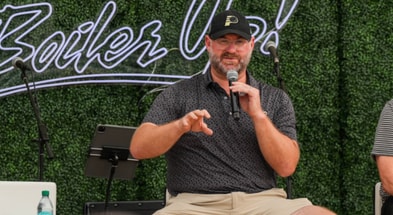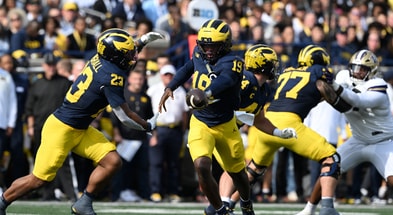Mike Bobinski discusses Purdue football's future and more
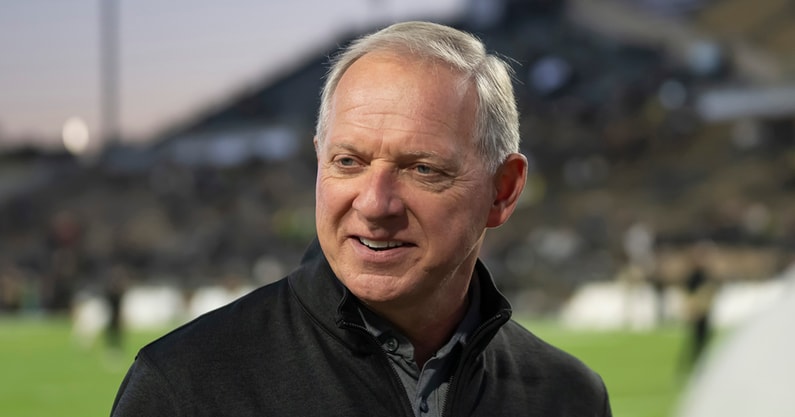
In Friday’s edition of Gold and Black LIVE, Purdue athletics director Mike Bobinski talked about the past, present and future of Purdue football with Alan Karpick. The following is an excerpt (edited for clarity) on the interview with Bobinski.
GoldandBlack.com: ESPN’s Pete Thamel reported last week that there were indications that Ryan Walters was going to be retained after the 2024 season. Does the report hold any water?
Bobinski: “I did not speak to Pete myself, so obviously, he is creating that from wherever he has his ear to the ground. I didn’t read it, because it doesn’t do me any good to read what someone else is thinking about.
I have a lot I want to say, and first and foremost, how incredibly grateful I am and we are for our fans and their support and how much I appreciate their passion for our program. I’m, I’m beyond grateful for the way our fans have continued to be supportive of us, and we absolutlely intend to reward their patience and their support in really significant ways in the years ahead.
Success in football in today’s college athletic environment is not an optional thing. You’ve got to be good in football. You’ve got to find a way. That doesn’t mean you’re going to win them all. Nobody is going to win them all every year. The Big Ten has gotten incredibly competitive, and it was competitive before (the league went to 18 teams). So it is not lost on us, at any level, how important it is to be successful in football. That is a priority.
This year the results to date, you know, seven games in frustrating, disappointing, unexpected, you name it; all of the above. All the frustration, all the angst that everybody feels. we feel it all day, every day. It is what we do for a living, and so we understand how that looks and feels and is not good. We get it completely.
We’ve struggled to find a way to play consistently high level winning football. We have flashes. We have moments. We had an incredible second half at Illinois and some other snippets along the way. We just haven’t been able to consistently put together enough good football. And that’s (the inconsistency) not what we’re looking for and it will not be acceptable going forward.
And so we continue to to evaluate and to talk and think about how we might get better day in and day out here, that’s that is the goal these last five games of the year, is to find ways to improve, to continue to get better.
I will say this; I’m around it a lot. I watch practice. I watch closely what’s going on. It’s my job to take emotion out of it and dispassionately evaluate and objectively evaluate.
The team has stayed connected, you know, incredibly connected. They’ve . They’ve stayed connected to coach Walters. They believe in him and his vision for where this program is going. Being able to take what I see in practice and convert it to the game field has been a challenge. It just has not translated the way that you think it should and could. And that is an everyday dilemma that we’re trying, that everybody’s trying, to solve. How do we do that? How do we take what we think we have available to us here in terms of ability and have success in scheme and process and actually play winning football? So again, we hope to see more of that here as we progress through the end of the season.
GoldandBlack.com: I see you regularly with Ryan after the weekly press conference and I know how often you have regular discussions with him. How frequently does that happen, and how do you stay positive, as one of your jobs is to support your team?
Bobinski: Absolutely, and to your point on that, it is my job to support our coaches across the board, every single one of them, and give them the support, the resources, whatever it might be, in order to be successful. With Ryan, particularly given the fact that he is, he’s still a very young head coach we talk sometimes every day. We rarely miss a day at this point to talk at some level about what he sees, what we’re trying to do, what we’re trying to accomplish, the changes and adjustments that we’re trying to make to move towards a higher level of success. That’s what’s called for. I hired him because I felt he was a incredibly intelligent, incredibly thoughtful, incredibly motivated and focused coach.
He (showed his) ability to understand the game of football was demonstrated to me at an extraordinary level when he switched, having never coached an offensive position in his entire life, all of a sudden, became the offensive coordinator out of necessity at that point in time, because we had to make a change (at offensive coordinator dismissing Graham Harrell) If needed any form more validation, about his command of the game, that’s that’s not in question for me. It’s about, do we have all the right pieces in place? Do we have the right organization around him? Do we have the right talent?
As I’ve said to Ryan, the key is that when you’re at the point we’re at right now, you must be brutally honest with yourself. You have to evaluate every single thing we’re doing objectively, every approach we’re taking, every staff member, every player, and honestly, without lowering the standard.
You can’t trick yourself. You can’t say, Well, it’s good enough. Good enough doesn’t cut it. Good enough is not what we’re looking for here we’re looking for excellence. We’re looking for high level success, and so making sure that we hold ourselves to that as we evaluate things moving forward here is really important. Being willing to have the courage to make whatever changes need to be made (is essential). I have no doubt that he’s capable of that, and I will be. I’ll push as hard as I need to push, but I don’t think that’ll be necessary. I think we’re very much aligned with the things that we see and the adjustments that we’ll need to make going forward.
GoldandBlack.com: The buyout provisions are public knowledge. How much do you have to weigh a financial decision to whether Ryan can do the job in your final evaluation?
Bobinski: Any organization lives and dies around its economics and finances; we get that at the end of the day. However, we would never allow the financial reality of a decision to defer that or force us into a different position because there’s just too much at stake. You know, there is (too much at stake) for everybody, and we understand that I understand that the University understands it, and we’ll make the decisions that we believe are supported by what we observe and the facts and beliefs that we have in our future going forward.
GoldandBlack.com: With all the changes in college sports (and football), how much does the new world of the transfer portal, NIL and the like speed up the (evaluation) process?
Bobinski: (In some ways) You’ve got the two little guys sitting on your shoulder saying, “Hey, hurry up and do this.” And the other one says, ” Hey, hold on a second here. Let’s not, let’s not just jump from left to right and, you know, make wholesale, quick, quick trigger type of changes,”
I look at other programs that we have and to men’s basketball is a tremendous example of continuity, consistency, a long sort of a slow burn of a build, and then you get to a tremendous place of success that’s then sustainable. Every sports is different. I get that. But I think there are multiple ways to do this, and I don’t think you should get blinded by the realities of this current environment and really these last two years.
And I’ll go back to even (coach) Jeff Brohm’s last year. The NIL world started to become sort of upside down, and the transfer world was in conjunction with it. That sort of movement and unrest and instability in and around the environment didn’t play particularly well to our strengths. I will be honest about that. I’m not making an excuse. That’s a fact. It just is a fact.
Top 10
- 1Breaking
CFP Top 25 revealed
The official rankings are in
- 2New
CFP Bracket
Official first 12-team field
- 3Hot
Strength of Schedule
CFP Top 25 Weakest to strongest
- 4Trending
LSU return?
New AD on Nick Saban
- 5
Auburn Coaching Search
Latest names to know & more
Get the Daily On3 Newsletter in your inbox every morning
By clicking "Subscribe to Newsletter", I agree to On3's Privacy Notice, Terms, and use of my personal information described therein.
As we move into the new world, it will come back to us in some ways. There will be a leveling out of how you attract and acquire young recruits and transfer recruits that arm us with resources that will look very similar, if not identical, to the people we’re competing against. And that has not always been the case. That is not an excuse. It’s a reality, and we’ll adjust here as time passes. Certainly, the finances matter, but again, that is not a driver of our decision at this point.
GoldandBlack.com: The football program has had some recent de-commits and you have to get geared up for the transfer portal. How do you say to Ryan “We’re behind you;” what is your message to him?
Bobinski: ER talk about the activities that are underway, the recruiting focus that we have, the needs that we have from a position perspective, where we clearly need either front line or really quality depth in order to give ourselves a fighting chance here, to sustain a 12-game season.
The de-commits are part of today’s reality. It just is. You know, you know what happens when a team is struggling? Folks will call a recruit or reach out to recruit say, “Hey, have you thought about de-committing?” So next thing you know, it’s like, hey, let’s de-commit. I don’t mean to be dismissive of it at all. But you ultimately get to reconstruct your roster for the future; we’ll end up with the right young men and young men who truly belong and want to be at Purdue. That’s the way Purdue teams have always been successful, and that’s how we’ll be successful in the future.
GoldandBlack.com: It is a perception that Purdue is a school academically and athletically that wants to work harder and smarter than other programs and can be a competitive advantage. How much of that plays into what Ryan’s program can deliver in the future?
Bobinski: “I think your point about that (academics) being a competitive advantage for us is something that we need to emphasize even more as we move forward. As the recruiting resource world levels out here (as a result of the House Settlement in 2025-26), assuming things hold together, you we are able to really focus on those other elements that you bring to the table for us.
I think we should double down on that identity and really build our football program around those types of young men. Ryan’s three hallmarks that he talks about are being competitive, being tough, being disciplined, and bluntly I’ve told him , I didn’t think we were hitting the mark on any of those three.
Ryan is very thoughtful and a willing listener, and doesn’t, doesn’t buck up against honest conversation, which I appreciate very much. But I told him, didn’t think we were doing any of those three things, and that refocusing on that is ultimately how Purdue teams will be successful. If you have overwhelming talent is a greater margin for error but if you don’t have overwhelming talent, which has never really been our thing in any sport, you’ve got to have all those other elements in place. You’ve got to be really competitive, you’ve got to be ultra tough, you’ve got to be buttoned up from a discipline and accountability perspective, and I think doing all of that at a higher level is definitely (a goal to have) in store for us.
GoldandBlack.com: What have you learned about dealing with struggling coaches in your experience as AD over all these years?
Bobinski: I think that the key thing, just like in any relationship like that, whether it be in a business world or any other organization, you have to be present, you have to be available, you have to be you have to be a willing listener. You have to let people say what’s on their mind, what’s bothering them, and then offer what you believe is appropriate feedback.
It’s no athletic director’s job to tell any coach how to coach their team, or (for example), what kind of offense to run. It is my job to pose questions and to sort of plant seeds of thought and hopefully move, move coaches in any sport in a positive and more more successful and fulfilling direction from a from a program perspective.
And you know what? That’s how I do it with Ryan. We just have an honest and open conversation about all things. I appreciate that about him that I don’t have to filter. I’d like to think he doesn’t need to filter what he tells me regarding his observations and approach to how we want to move this thing forward. So I it’s a healthy dialogue. As he said at the press conference the other day, this is a performance-based business. We all get it. We all understand that results ultimately determine the outcome, and (positive outcomes move (the program) forward, period.
GoldandBlack.com: You have Northwestern on Saturday. How important is that game to the program’s future?
Bobinski: We want to win games down the stretch here. I mean, that is the goal.That’s how everybody’s measured in this in this profession. So that that is certainly part of it. (But) It’s more than that, obviously. Actually, when you are where we are, there, there are some built in limitations in who we are right right this moment. At certain positions, we’re just not, maybe as deep and as as as gifted as we’d like to be. But that doesn’t mean we shouldn’t find ways to put our collective group in a position to be successful. So I want to see some success. I think we all want to see success, but at the very least, we want to see a higher level of execution and performance.
Pregame:First Look: Northwestern | First and 10: Northwestern at Purdue | Purdue’s plan at QB? Play Hudson Card and Ryan Browne vs. Northwestern | The 3-2-1: November will go long way to define Ryan Walters’ Purdue tenure | Opponent View: Northwestern | Gold and Black Radio: Purdue prepares for Northwestern | Number Crunching: Purdue-Northwestern week | Comparing Purdue QBs Hudson Card, Ryan Browne |

